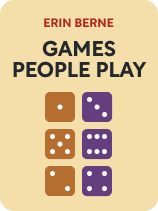

This article is an excerpt from the Shortform book guide to "Games People Play" by Eric Berne. Shortform has the world's best summaries and analyses of books you should be reading.
Like this article? Sign up for a free trial here .
Where does the human need for recognition stem from? What can biology and psychology tell us about the hunger for social recognition?
The desire you have to get more likes on social media or be popular in school can be explained by science. From childhood, humans need physical and social contact to survive and become functional. Eric Berne explores this phenomenon in his book Games People Play.
Here’s why social recognition is vital to our well-being, according to Berne.
Our Hunger for “Strokes” Is at the Root of Social Interaction
In his book Games People Play, Eric Berne argues that the human need for recognition and interaction arises from an underlying “hunger” for physical contact. This hunger begins in infancy as a need for “strokes”—literal for the infant, metaphorical for the adult—and remains linked to our mental and physical well-being throughout life.
First, we’ll trace this need from infancy to adulthood. We’ll then discuss how it leads to what Berne calls “time structuring,” our mutual effort to fill our days with necessary social contact.
(Shortform note: Berne is known for using strict reductionism: He worked by breaking social behavior down to its (theoretically) smallest parts. Compare this to the holistic approach, originating in Gestalt psychology, which argues that you can only understand a whole by looking at how all of the parts go together. Combine the two and we reach a fuller perspective: Break an object down to its elements, then figure out how they relate. For example, you can’t understand a car motor by looking at its parts in isolation—you also have to figure out how they go together. Now do the same for the psyche: Identify its smallest elements, then explore how they compose the larger structure and its functions)
Infants Depend on Sustained Physical Contact
As infants, we need consistent physical attention from our mothers. Without sustained “stroking”—literal stroking, or head pats, peek-a-boo, and so on—infants don’t develop properly.
If an infant is neglected for long enough, her brainstem will experience nerve cell degradation. Without intervention this leads to death. So regular physical contact is a biological imperative for infants.
(Shortform note: Plenty of research confirms that infants need physical contact. It’s even been found that premature or otherwise unhealthy infants respond positively to light massage, suggesting that the nerve degradation Berne describes may be reversible. Going even further, varied stimulation like singing, playing games, laughing, and cuddling, has numerous benefits: They help the infant to develop early social and emotional competence and enhance their curiosity and appetite for learning. Even further, speaking and reading to babies can accelerate their language skills, leading to higher linguistic competence later in life.)
Adults Subsist on Social Recognition
Beyond infancy, our human need for recognition, interaction, and physical contact remains strong.
Unfortunately, Berne says, cultural conditioning discourages us from directly seeking a physical solution to this problem. As we age, we learn to make do with less intimate forms of recognition. By adulthood, the infant’s longing for her mother becomes a subtler need for simple social recognition—“Hi, how are you?” / “Good, thanks! You?”
Though we’ll no longer die from lack of touch, social recognition (Berne’s “stroking”) remains vital to our well-being as adults. Studies have shown that inmates who experience the prolonged social isolation of solitary confinement often develop physical and mental health issues. And even in laboratory settings, sensory deprivation can lead to temporary psychosis.
So, Berne infers, any kind of social interaction is better than none at all. This is why games still play a large role in our lives, despite often being unhealthy.
| The Types of Strokes Beyond Berne’s work in Games People Play, transactional analysts have delineated several different kinds of strokes. This can help us learn what kind of strokes, or recognition, we’re getting, and which we may need more of: -Do you get mainly positive or negative social contact? -Do you receive enough unconditional support, or mainly conditional recognition (“I love you no matter what” vs. “I love you because you validate me.” -Do you get mainly verbal or nonverbal strokes? Interestingly, Gary Chapman’s book The 5 Love Languages seems almost to extend right from Berne’s theory: Everyone needs strokes, Berne says; everyone needs a unique kind of recognition, adds Chapman. Read our guide of The 5 Love Languages here to learn which styles of recognition you and your partner need: physical touch, words of affirmation, acts of service, quality time, or gift giving. |
We Work Together to Satisfy Our Shared Need for Recognition
Now that we’re grounded in this understanding of why we interact socially, let’s look at what comes next: Because we all need recognition, we build social interaction into our everyday lives.
Berne argues that humans are naturally uncomfortable with inactivity, observing that when there’s little to do or nothing left to say, people get anxious. Imagine going on a first date where the conversation repeatedly fizzles out—few could stand the discomfort.
This malaise reflects our need for continual social contact: When the “strokes” stop flowing, we tend to get tense and uncomfortable. Berne argues that this discomfort is analogous to physical hunger, such that neglecting it is like starving.
Getting the needed recognition helps assuage our discomfort. So, Berne argues, we all unconsciously seek out interaction in order to stave off social starvation. And we all share this need, so our mutual seeking leads to everybody structuring their days around enough social interaction to stay “full.”
According to Berne, this is the point of social living: It helps us help each other with our need to be seen and heard, so that we all avoid emotional starvation.
(Shortform note: While Berne denotes both “recognition hunger” and “structure hunger” in Games People Play, we can infer that the latter is an extension of the former. Berne doesn’t explicitly show that we hunger for structure itself, but it’s plausible that structured interaction follows naturally from our hunger for social contact. Normal hunger for food is necessary for structured mealtimes, but we wouldn’t say that we hunger for mealtime itself. This is a case of “necessary but not sufficient”—hunger for social contact is necessary for structured interaction but doesn’t create it in and of itself.)
Consider your own immediate friend group. You likely have many shared interests and plenty of group-specific mannerisms. Berne calls these “pastimes” (for example, chatting about rock climbing gear) and rituals (like secret handshakes and inside jokes). These interactions, Berne would say, structure your days and fill you up with healthy social contact.
Without this social recognition, we’ll lapse into that social malaise—a hunger that can lead to physical and mental health issues.
(Shortform note: The Covid-19 pandemic effectively illustrates this dynamic. As the pandemic lingered longer than expected, many people began to experience depression and related mental health challenges—likely due to lengthy social isolation. Lacking much human contact, Berne would say, they experienced prolonged social hunger, which negatively impacted their health.)
| Social Media as a Superficial Substitute for Real Relationships In Berne’s time, social media didn’t exist, and we weren’t yet staying up late to scroll feeds and talk with strangers online. If he were still around, Berne might notice that our rapid, always-there access to online socialization allows us to avoid our inactivity discomfort as much as we want. But what if by stuffing ourselves with unfulfilling online interaction, we’re actually making ourselves less resilient to the discomfort we’re trying to avoid? Studies have found correlations between social media addiction, depression, and lack of resilience, while other research shows that close relationships contribute to emotional resilience. This suggests that online “strokes” are the emotional equivalent of potato chips, while real-life relationships are more like a well-balanced meal. Again, Covid-19 illustrates this well—one study found that increased social media use during lockdown correlates with decreased mental health. But at the same time, the phenomenon of family Zoom calls led many to reconnect and bond. So it’s not necessarily screen time that’s unhealthy, but the kind of screen time. Scrolling Twitter is fundamentally distinct from family Zoom: In the former you sit and consume a deluge of unfocused information, and in the latter you have focused, face-to-face conversation—despite the screens between you. |

———End of Preview———
Like what you just read? Read the rest of the world's best book summary and analysis of Eric Berne's "Games People Play" at Shortform .
Here's what you'll find in our full Games People Play summary :
- The many ways that we relate to one another through “games”
- Why you might be missing out on the fulfillment of game-free living
- How to identify and overcome unhealthy games






